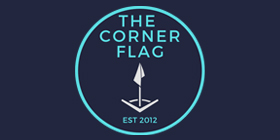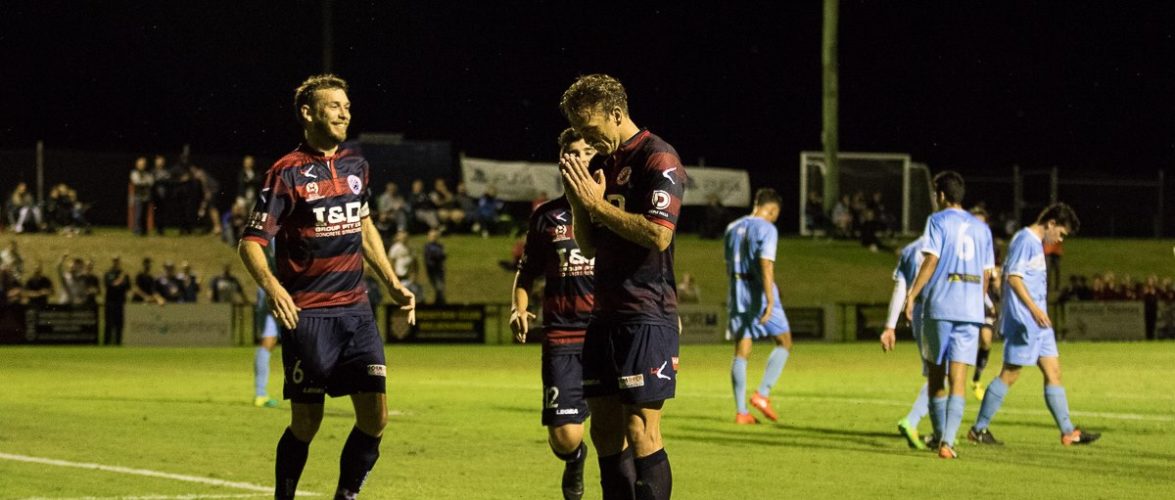Image: Ashley Perez
There is something romantic about a professional footballer spending his final playing days at the club where it all began. Before all the highs and lows, triumphs and heartaches, joys and disappointments that occurred along that journey, there was a youngster determined to make his mark on the footballing world.
The career of Ljubo Milicevic has endured plenty of ups and downs but the former Socceroo returned to the game this year following a three-and-a-half-year absence and is revelling in the opportunity to turn out for his childhood club Dandenong City.
While the club nicknamed Hajduk was known as Chelsea during Milicevic’s childhood, most of the faces from his youth are still present in the new home at Endeavour Hills, with one of their favourite sons discussing what it means to be back playing the game he loves amongst old friends.
“It’s good to be back amongst all the guys I grew up with. The decision to come back came after I overcame my darkness or depression, whatever the West wants to call it, was due to the fact that I love the game,” he said. “It’s where my heart and soul has always been, so it is nice to reconnect with the community.”
The signing of the former Olyroos captain caught much of the football community off guard, with the 36-year-old ending his on-field hiatus to join Dandenong City’s cause as the club hopes to gain promotion to the top flight of Victorian football for the first time in its proud 36-year history.
Former A-League stars Mate Dugandzic and Nick Kalmar joined a host of high-profile recruits from the NPL top tier – a project Milicevic is happy to be involved in.
“It was a logical choice to come back and play for Dandy as they are fighting for promotion and have brought in good players and coaches. They have got a lot of ambition so there is a good buzz around the place. It’s a happy place and I’m lucky to be involved.”
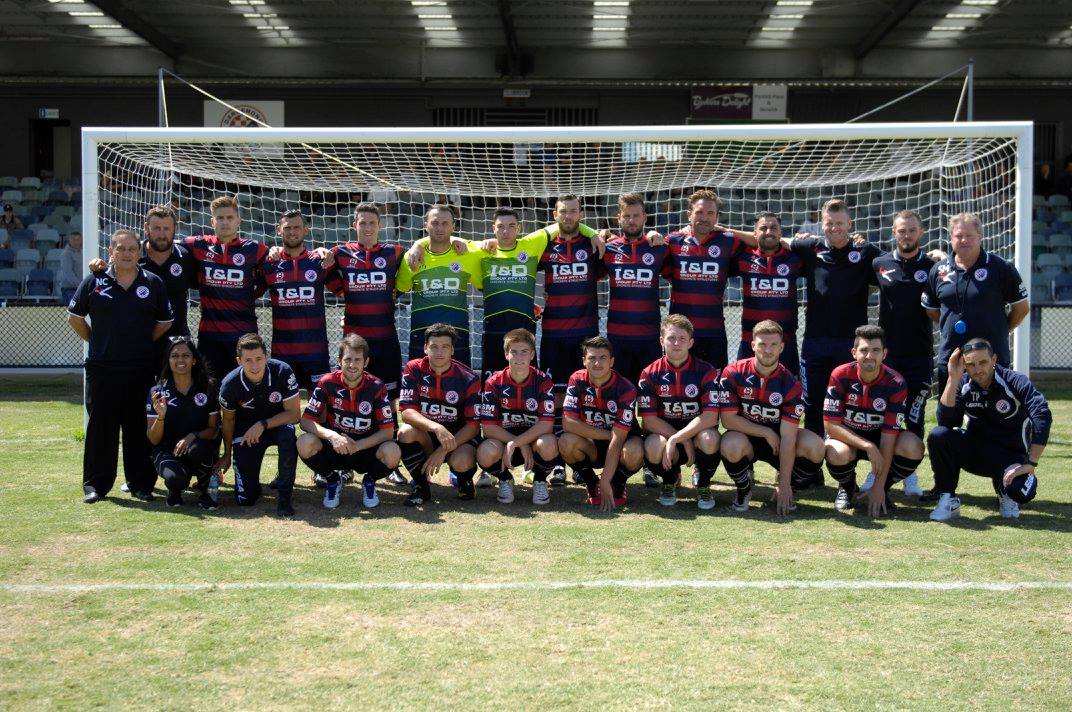
The beginning
Milicevic’s youth was spent living in the South Oakleigh/Moorabbin area, with his fondest memories from childhood spent kicking the round ball at home, Chelsea’s HD Thomas Reserve base, or at school.
“I remember kicking a ball around as that was what I always did, whether it was against the wall or on the court. I was always playing at school, during recess and at lunchtime. If we didn’t have a ball, we’d be playing with cans. If we didn’t have cans, we’d be playing with a tennis ball, so we all grew up together.”
He spent his secondary school days at St James’ in East Bentleigh before finishing his VCE years at Mentone-based St Bede’s College. At the former, his classmates included brother pairing Marco and John Maisano, both of whom forged professional careers in Europe. Marco is now owner of NSR Australia and John is involved in the coaching set-up at Bulleen Lions.
At St Bede’s, future Socceroos teammate Vince Grella was a classmate, while Chelsea Hajduk duo Eugene Galekovic and David Davutovic were also in attendance. Down at Chelsea’s Springvale Road base, future national league players Joey Rajher, Anthony Pelikan, Antun Kovacic and Daniel Radosevic were all progressing through the club’s youth ranks at the same time as Milicevic.
That 90s as a whole was a golden era of production for Victorian football in a decade in which the state’s two main NSL sides won a combined five championships between them, with the former VIS and AIS graduate explaining what made those years special.
“We had a generation of boys who were talented and were doing well so we all just pushed each other and that always helps when you’re playing amongst better players,” said the eight-time Socceroo.
“From there onwards I kicked on to the VIS and AIS, playing with the best every day, so it is natural that I was going to progress. But all in all, we had a good bunch of boys in that generation and a few of the boys kicked on and went onto play for Australia.
“It was that so-called whole golden generation and even though I was only in the periphery, a lot of those boys were from that time.”
NSL debut
Having grown up supporting Melbourne Croatia, the talented teenager made his NSL debut for the club in 1999, having captained the AIS to consecutive national youth league titles. However, his time at Somers Street was short-lived. His continued commitments in Canberra restricted him to just 45 minutes in the Knight’s famous red kit, although Milicevic would return to North Sunshine in 2013 for another short stint.
“Unfortunately at the time I signed a contract to play the final five games of the 1998/99 season with the Melbourne Knights, but the AIS was also in the Youth League finals so I only ended up playing one half for the club. Nonetheless, Melbourne Croatia was the team we all supported as kids and I was glad to have played for them.”
Having won two Championships in the middle of the decade, the Knights failed to make the play-offs in the final three years of the decade at a time when the league’s benchmarks in terms of professionalism were city rivals South, newcomers Carlton and Northern Spirit, as well as the Perth Glory – a club which Milicevic joined shortly afterwards when a transfer to dream club Hajduk Split fell through due to professional reasons.
“It changed over time and it fell away after the mid-90s when the club no longer had the same ambition. The clubs with more money and more professional setups came in, so my decision to go to Perth Glory after coming back from Hajduk Split – who couldn’t pay the transfer fee to the AIS – was a professional one. I knew that it would be better for my career if I was in Perth and training in a professional environment and it ended up being that way.”
Nonetheless, Milicevic is gratified to have played for a club as historic as the Knights, an outfit he will face off against on Wednesday night when his City side face their sister club in a blockbuster Round 6 FFA Cup clash.
“I got to play for Melbourne Knights recently in 2013 and it will always be our club. I grew up supporting them and was lucky enough to grow up watching greater players and great generations there, such as the likes of Simunic, Viduka, Silic, Horvat, Marth, Juric, the Pondeljak brothers, the Cervinski brothers and Zeljko Adzic.”
Two memorable seasons in the West followed for the teen, who scored for the Glory in the 2000 NSL Grand Final defeat to the Wollongong Wolves, as Bernd Stange’s men gave up a 3-0 lead at half-time to lose the game on penalties. Despite this loss, Milicevic fondly recalls the club’s professionalism, the buzz generated by playing for Australia’s best-supported club at the time, and the high-quality players he called his teammates in Western Australia.
“It was great as the club was able to pay us a full-time wage and I was able to commit to football 24/7 and train twice a day with extra fitness coaches on the side and really prepare myself as best as I could,” he said.
“The buzz and the professionalism around the place was as good as it got in Australia at the time. It was a good setup with big crowds and a lot of passion for the club.
“I was lucky to be a part of a great team with the likes of Kasey Wehrman, Troy Halpin, Con Boutsianis, Damian Mori, Scott Miller, Bobby Despotovski, Jason Petkovic and my best friend Ivan Ergic, whom I later played with in Switzerland. They were not only good players but also good mentors and we basically had a team that had all played for the Socceroos at one point or another. I was just blessed to be a part of a great bunch of boys.”
Switzerland
Following on from the 2000/01 NSL season, the league’s most impressive youngster captained the Young Socceroos at the Under-20 World Cup in Argentina, as Ange Postecoglou’s side exited the competition at the group stage.
A European move to Swiss club Zurich eventuated, although Milicevic remembers his early struggles in Switzerland with a loan spell at champions Basel in 2003 – confinded to a bench role – followed by a transfer to league minnows Thun that summer.
“Early on it was difficult as I went there still recovering after doing my knee playing for Australia at the Under-20 World Cup. I also did my groin recovery there so basically for the first few years in Switzerland I did not play any football and I had to bite the bullet and go to a really small club in Thun, which basically had an NPL setup.”
Milicevic eventually captained the club, helping Thun qualify for the Champions League in 2005, in addition to captaining the Olyroos to the Athens Olympics which he missed through injury.
“At Thun there were a lot of young boys who were determined and we had a great coach who brought us all together. Within a year we were challenging for the title and within two we had qualified for the Champions League.
“We were blessed to be a part of it all in what was a great little town in a beautiful country. I got to play against some really good players such as Ribery while he was still at Marseille, Henry, Bergkamp, Pires and Fabregas at Arsenal, and Wesley Sneijder at Ajax, so it was a great experience.”
The European adventure wasn’t his first foray into European competition, with Milicevic being a squad member of Basel’s 2002-03 Champions League side which reach the Round of 16 having knocked out Liverpool in the group stages.
At the club he was reunited with former AIS and Perth Glory teammate Ivan Ergic, who later represented Serbia and Montenegro at the 2006 World Cup, and ex-Wollongong star Scott Chipperfield.
“Basel was very good too, even if I didn’t play as much, because I travelled everywhere with the team. To go to the likes of Juventus, Valencia, Liverpool and Manchester United was special and I sat on the bench a few times. It was a great experience and we had an amazing team full of international players and they were all really good boys whom I’m still in contact with to this day whenever I go back to Switzerland. It is nice to see them all regardless of whether they were my teammates from Zurich, Basel, Thun or Young Boys.”
Despite captaining Thun in their Champions League campaign and being a part of the Socceroos squad for the World Cup qualifying play-off games against Uruguay, Milicevic was a surprise omission from Guus Hiddink’s Socceroos 23-man squad in Germany in 2006. While keeping tabs on his teammate’s progress across the border, Milicevic fondly remembers the European summer of 2006 when he partied at a VIP nightclub during the Cannes Film Festival to Bob Sinclair dropping ‘World, Hold On’.
A season captaining fellow Swiss Pro League side Young Boys Bern followed, as purported interest from the Premier League and Croatian champions Dinamo Zagreb circulated in the media in 2007 – the latter Milicevic says he’d never have joined out of respect for Hajduk. However, a desire to return home and be with family saw the 26-year-old walk out on a three-year deal to join defending A-League Champions Melbourne Victory in season three of the competition.
A-League
A bust-up with the club hierarchy led to Milicevic being punished alongside teammate Archie Thompson for missing a team breakfast, a situation compounded by playing restrictions due to a knee injury.
His time with Ernie Merrick’s outfit ended after just two games, with his contract terminated in February 2008. Twelve months away from the game saw Milicevic battle his first publicised bout of depression, filling in time by working at his friend’s garden nursery while also training with the newly relocated Dandenong City.
A return to the professional scene saw him join the Newcastle Jets under new manager Branko Culina in early 2009, helping the 2008 A-League Champions qualify for the Asian Champions League Round of 16. Milicevic was also part of the last Jets squad to reach the A-League finals in 2010.
He exited the Hunter in January 2011 having made himself a fan favourite with the club’s active supporter group the Squadron.
A short stint in the VPL with Eddie Krncevic’s South Melbourne paved the way for Milicevic to finally live out his dream by joining Hajduk Split in June 2011.
Croatia
Milicevic immediately endeared himself to the club’s passionate Torcida supporter group before being made vice-captain (captaining friendly games) by manager and Bulgarian football legend Krasimir Balakov.
Despite a promising start to life in Split, the 30-year-old exited the Poljud in January 2012 after five league appearances for the Pride of Dalmatia. While his departure from the club was blamed on persistent injuries at the time, Milicevic lifted the lid on the real reasons behind his exit.
“I hurt my calf early on and was struggling to get back and I played in games without training, but what actually happened was that we weren’t getting paid for six months.
“There was a press conference and the local journalists asked me if this sort of thing happened back in Australia. I told them it did back in Newcastle where the FFA owns the club and the league essentially take over if the club can’t pay their players.
“I said this innocently and the next day the papers reported that I said the board and the president need to get the sack. The president had not watched the whole press conference and turned on me by absolutely smashing me in the papers before banishing me into the second team.
“It wasn’t because of performance, injuries or anything like that, but rather because the papers flipped the press conference and the president was a young guy who was only in that position due to politics and he just went for me.”
A victim of internal club politics which is often a normal part of football in Croatia, Milicevic prefers to remember the good moments of his time on the Adriatic coast.
“Although it was unfortunate, I got play against Dinamo – who had Mateo Kovacic in the team as well as Milan Badelj and Sammir – and I remember us scoring a goal against them in a packed stadium with 50 flares stopping the game for 10 minutes.
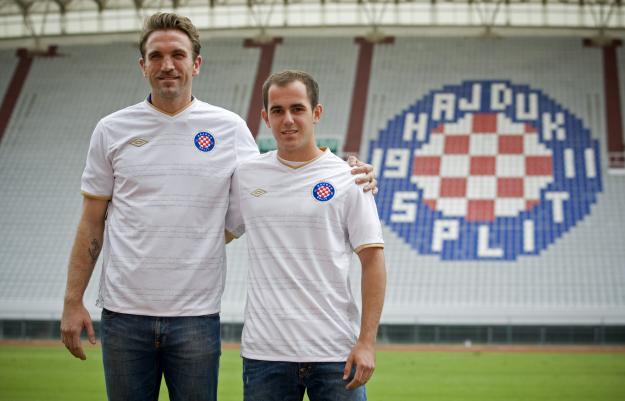
“So even if it was five games of five minutes each, I got to live out my dream. I lived it and I don’t look back at it with disappointment, as I literally lived out every dream I had in football.
“I never dreamed of winning a 100 caps for Australia or living out in a mansion with an infinity pool. As long as I got enough money for petrol so I could drive to the places I was having coffee at with my mates, I didn’t care about all the other stuff. I’m not caught up in this materialistic and capitalist world. That’s everyone else’s choice and my choice is to be happy and at peace, and I’m really at peace with what I achieved and what I did. I love life and I don’t look back on it with anger.”
Inner battles
Those sentiments are a stark contrast to the state Milicevic was in following his Hajduk stint in between playing stints with the Knights in the VPL – as well as a brief flirtation with Perth Glory. The former Socceroo fell off the radar from a footballing perspective as his battles with mental health continued. His three years away from the game prompted soul searching as he began a quest to reclaim happiness, disillusioned with the world around him.
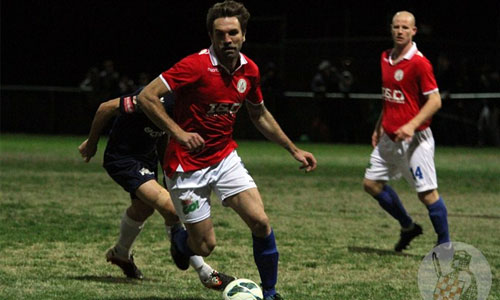
Milicevic publicly opened up about his struggles and believes more needs to be done to teach youngsters about how best to cope with mental health demons from an early age.
“It’s a taboo not just in sport but also society in general,” he said. “As kids we are not brought up with any sort of spirituality except for religion, which is force fed to us. We are not taught to meditate, to do yoga or anything which will keep us at peace.
“They’ll shove anything else down your throat even if it does not have any sort of application to the rest of your life. Whereas if they told us to meditate and be at peace and told us that shit is going to happen along the way and to be okay with it, that that’s life and life is actually suffering and that moments of happiness are rare – but that’s the journey.”
An impassioned Milicevic believes much of the blame lays within an education system that does not prepare people for the real world and all the hurdles which come with day-to-day life in a win-at-all-costs capitalist society.
“That isn’t taught to us. No such course or subject teaches us about philosophy and spirituality and making that compulsory. The whole education system and the way it works in this country and the West in general is backwards. Then they wonder why there are all these kids out there who are struggling and feeling lost and abandoned, and are turning to drugs, and why Australia has such an abusive culture. They don’t look at the core problems.”
Much has been said about Ljubo Milicevic’s career in the past decade or so. Never short of sharing his two cents’ worth, his insights are a stark contrast to the media-trained athlete of the 21st century that shies away from voicing their own thoughts in pursuit of protecting a certain image.
While missing out on the World Cup squad in 2006 and perceived failures at club land might have some looking back in regret, Milicevic is keen to emphasise that he lived out his dreams by captaining his beloved Hajduk Split, representing his country, and playing in the Champions League against the cream of the crop.
“I definitely lived out my dreams as I got to play Champions League, I got to play for Hajduk Split in the derby against Dinamo, in the Europa League against Stoke, in the club’s 100th birthday friendly against Barcelona in front of a packed out Poljud.
“I played for Australia probably not as much as I imagined, but then at the same time I got to play against the likes of Argentina and Germany at the Confederations Cup in Germany in 2005. It is what it is and it is not disappointing – I don’t know about many other kids but they were pretty much all my dreams and they came true.
“I never dreamed of driving a Ferrari but I dreamed about playing those games and I got to do it in front of the big crowds with my heart and soul; and I left that out on the pitch, so I can walk away a really happy man.”
One of the most naturally talented players this country has ever produced, Milicevic is now enjoying his playing twilight by giving back to the club which gave him his first taste of the world game, and off the pitch has managed to reconcile with mental hurdles of the past. An irreverent player who bucked the stereotype of the 21st century footballer, he’ll be remembered as a cult figure to many for his no-holds-barred approach to voicing opinions on football and society.
